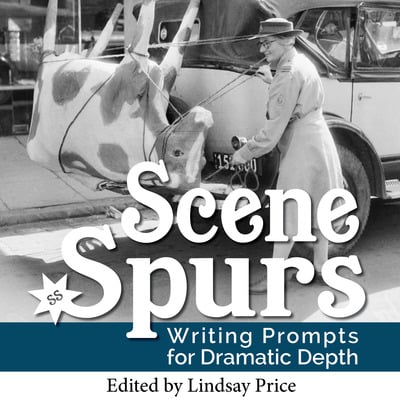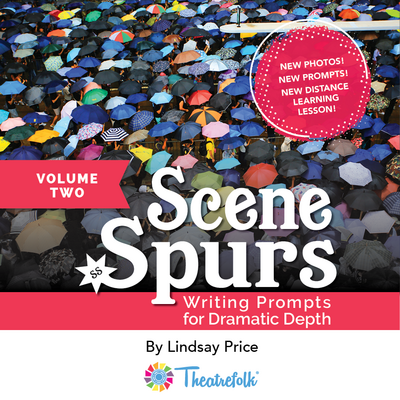A squirt gun would never be mistaken for a real gun, right? Dive into the thought-provoking world of Water. Gun. Argument and challenge what we choose to believe. A thought provoking and powerful piece in a docu-theatre style.
The Other Side of the Story: The Best Friend
Welcome to part two of Theatrefolk’s The Other Side of the Story series! (Find part one here.) Today’s post brings into focus a character that’s normally just outside of the spotlight: the main character’s best friend.
A best friend character can be used in many different ways. They can provide support, advice, or encouragement to the main character. They can help advance the plot by helping the main character through the journey to achieve their goal — for example, Harry Potter had Ron and Hermione to help him throughout his adventures at Hogwarts. Best friends can help soften a challenging character’s rough spots, or push a meeker character out of their comfort zone. Some stories feature best friends who are of pretty equal status, such as Woody and Buzz Lightyear from the Toy Story films, or Tom Sawyer and Huckleberry Finn. A best friend might act as comic relief, or even create a secondary plot. They’re super useful characters!
Exercise
For this exercise, students need to identify best friend characters that are important to the plots of their stories (whether they are characters from plays, musicals, books, movies, TV shows, or comics), but are clearly not the main character. Some examples might include Ned from the MCU Spider-Man films, Diana Barry from Anne of Green Gables, Samwise Gamgee from The Lord of the Rings, Linus from the Peanuts universe, Charlotte La Bouff from Disney’s The Princess and the Frog, Chad Danforth from the High School Musical series, or Patrick Star from Spongebob Squarepants. Have students create a table with the main character, the best friend character, and what story they come from.
Students will choose a best friend character from the list they’ve just created. They will use that character as the basis for a playwriting adaptation exercise, writing from the perspective of that character.
Students will then analyze the character and their place in the story — who are they, what are their personality traits, what are their goals, likes, and dislikes? What is their relationship with the main character? All of this will help students to get to know the character better. Give students time to write down as much information as they can.
Then, have students complete one (or more) of the following writing prompts:
1. Best friend characters are often known for a particular character trait that defines them. Maybe they’re tall and clumsy, super smart, the class clown, indecisive, argumentative, or a feisty redhead. Write a monologue from the perspective of your chosen best friend about their “defining trait.” What do they think about this trait? Do they agree with it? Do they like being defined by this trait? Would they change, and if so, what would they change and how would they do it?
2. Rewrite a scene where the best friend becomes featured for a moment. What would happen if the best friend had the spotlight? How would they react? How would the main character react? What would happen to the story? (As a follow-up, have students explain how this would change the outcome of the rest of the story.)
a) For example, in the Disney movie Descendants, what would happen if Prince Ben fell in love with Evie instead of Mal? Would Evie be excited, because she was secretly in love with Ben too? This might cause a fight with Mal, and would take the story in a completely different direction. Or, would she try to convince Ben that he’s mistaken and he should love Mal instead? This way she would try to make the story unfold as it “normally” would.
3. Write a scene where the best friend shares their true feelings about an important situation that occurs in the story. Are they happy for their friend? Angry? Jealous? Confused? Why? (Students could write the scene with the best friend talking to the main character about what’s happening, or the best friend talking to another character about what happened. Students might choose to write the scene as a monologue or song to be performed by the character.)
4. Write a flashback scene where you see a moment that was described by the best friend character.
a) For example, in the movie and musical version of Mean Girls, it’s revealed that Cady’s best friend Janis used to be friends with Regina, the queen bee. In this example, students would write a scene showing Janis and Regina’s friendship in middle school, or perhaps an incident that led to the end of their friendship.
If you wish, you can have students read the monologues or scenes aloud in front of the rest of the class, or take it a step further and have students rehearse, memorize, and perform the scenes as an acting exercise.
Related Articles
Scene Spurs - Writing Prompts for Dramatic Depth
by Lindsay Price
Scene Spurs is a collection of photo-based writing prompts developed by playwright Lindsay Price. The set includes 35 different Spurs along with an instruction guide to integrate them into your drama classroom.
Scene Spurs: Writing Prompts for Dramatic Depth Volume Two
by Lindsay Price
35 more photo-based writing prompts developed by playwright Lindsay Price. Includes an instruction guide and tips to integrate them into a distance learning curriculum.

